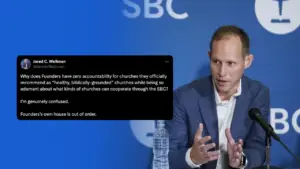Baptist Press reports the gathering of 15 “prominent” evangelists in Jackson. The meeting was initiated by Jerrry Drace to discuss issues that they judge vital to their ministries. Unfortunately but not unexpectedly, the growing recovery of our denomination’s doctrinal heritage is one of their great concerns. The other is the seeker-sensitive approach to ministry.
I have classified some of the reported comments of participants into 4 categories.
1. Concerns that every Southern Baptist Calvinist I know would share, assuming the scenario that is described is accurate (Calvinists in the SBC have been so long and are so often caricatured that this caveat is understandably necessary).
Drace told the group he currently is working with some young pastors who are “so leaning in this morphed Calvinism that they almost laugh at evangelism. It’s almost to the extent that they believe they don’t have to do it. So [Calvinism] gives them an excuse not to do evangelism.”
Anyone professing Christian who laughs–or “almost laughs”–at evangelism should be sharply rebuked. I hope brother Drake will do exacdly that.
Sammy Tippit of San Antonio, Texas, asked if some of the seeker-friendly approach could be attributed to a backlash against the type of manipulation people see in televangelists.
I think he is partially correct. More and more serious pastors and churches are growing weary of seeing people emotionally jerked around by well-intentioned but biblically shallow preachers. Such manipulation is not limited to televangelists.
2. Concerns that leave me wondering exactly how Calvinism got implicated.
Wayne Bristow of Edmond, Okla. added that he’s distressed about having to “tiptoe” around terminology for fear someone will misunderstand or take his comments another direction. For example, he said he has always told people who have asked that he can preach and give an invitation with authority and confidence because he believes in the sovereignty of God.
“When I preach I know the Holy Spirit is at work in the hearts of people in that congregation -– arresting them, convicting them, convincing them and drawing them to Christ,” Bristow said. “If I didn’t believe that, I have no authority; I have no confidence. All I did would be in my own strength, and I would be forced immediately into a ministry of manipulation. But we live in a time now where [Calvinism] has come so much to the forefront that when you say something like that then … you’ve got to be labeled.”
I am not certain where the Bible teaches that one’s authority is based on being certain that when he preaches the Spirit is arresting, convicting, convincing and drawing the hearers to Christ, but that is beside the point (to say nothing of a “ministry of manipulation”). Is the concern that Calvinists will question that kind of thinking or label it? I just don’t understand the concern.
3. Concerns that sound like the greatest problem with the seeker-sensitive “system” is that it prevents vocational evangelists like those at the meeting from being invited to preach in churches that employ it.
“When the pastor preaches on Sunday morning in a Hawaiian shirt, shorts and tennis shoes, do you think he’s going to bring in this fire-breathing evangelist who wears a tie and black suit and have him stand up there and tell people that they are going to hell?” Michael Gott of Keller, Texas, asked rhetorically.
“Do you think he’s going to change that whole user-friendly approach to have somebody like you or me tell people that they must recognize there’s something wrong, and what’s wrong must be changed, and the only one to change it is Jesus Christ.
…
We’re not even within the system,” Gott said. “It’s not like [leaders] are rejecting evangelists, but the system has eliminated the role of the vocational evangelist. That is going to have to be changed by seminaries, by denominational leaders who challenge churches to use an evangelist.
These comments speak for themselves.
4. Concerns that puzzle me in the way that they are expressed:
“Southern Baptists neglected serious Christian education from the early 1960s, and that’s when all the trouble started. From discipleship training we went to the amorphous youth groups, whose only real good was to keep kids happy until they graduated from high school and graduated from church. Now, you have a generation [of college students] who have come along and want something deeper and they have latched onto Calvinism” [emphasis added].
Poe said the “greatest missionary” for Calvinism in the local church is John Piper, a Reformed Baptist theologian, preacher and author who currently serves as pastor for preaching and vision of Bethlehem Baptist Church in Minneapolis. Two of his most popular books are “Desiring God” and “Let the Nations be Glad! The Supremacy of God in Missions.”
“He’s effective because he’s so passionate,” Poe said. “He holds huge, stadium-type events that are rip-roaring. There’s nobody else doing anything like that so he becomes [Calvinism’s] expositor. But John Piper’s version of Calvinism is not something John Calvin would espouse, or even that Charles Spurgeon [British reformed Baptist preacher] would espouse.
“Calvinism has an appeal because it tends to have an answer for everything -– you can explain everything [by saying] that God predestined it.”
Is the rise of Calvinism really “trouble?” No one questions John Piper’s passion. But to attribute his effectiveness to that one quality is naive at best. There are lots of passionate arminian preachers. I dare say that most if not all of those gathered for this meeting would be classified such. Could it be that Piper’s effectiveness stems from his Christ-centeredness and biblical fidelity? To declare that Calvin and Spurgeon would not espouse what Piper teaches (on the doctrines of grace) is debatable, though not really that important.
To claim that Calvinism’s appeal is its tendency to “have an answer for everything” borders on hubris. I don’t know what type of “Calvinism” Poe has been observing but whatever it is, it is foreign to me. Furthermore, and more troublesome, if his assessment is accurate, then it is an indictment on the thousands and thousands of young leaders who are coming to embrace the doctrines of grace, suggesting that their motivation stems from wanting “to have an answer for everything” rather than wanting to know and believe whatever God has revealed in His Word.




















